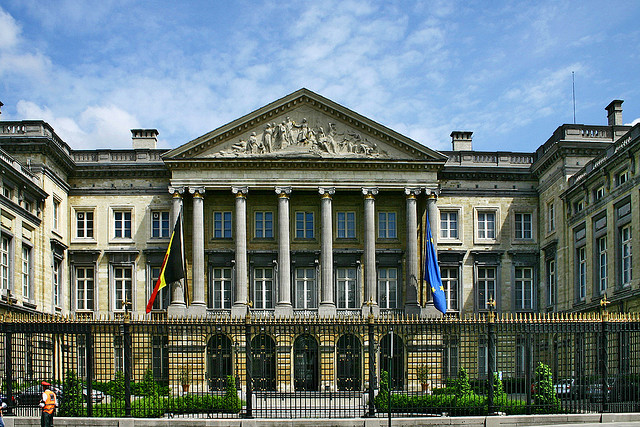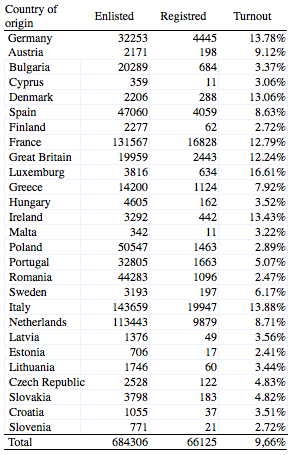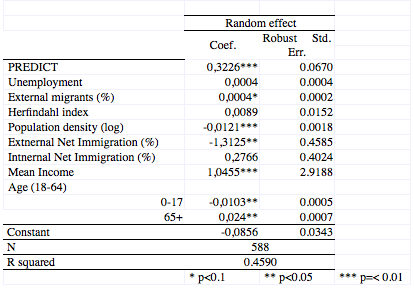Political habits learned in home country are determinants of EU expats’ registration in European elections
The European Union has seen, over recent decades, the creation of political structures spanning the continent. It has coincided with increased citizen mobility, with millions of Europeans opting to live, work and stay in other EU member states. Here, Yves Dejaeghere, Luana Russo, and Louise Nikolic show that political habits that have been acquired in a citizen’s home country are determinants of EU expats’ registration in European elections.

Belgium’s federal parliament building (Credit: Chrstian Stock, CC BY 2.0)
Electoral turnout is one of the most studied subjects in political science. We know from the academic literature that the institutional context (e.g. compulsory voting, the electoral system, the polarisation and size of the party system and registration requirements) and structural characteristics (e.g. economic development and degree of urbanisation) to a large extent affect the electoral participation of citizens. So where an individual lives has a large influence on the odds of casting a vote, regardless of individual-level characteristics. Academic attention has also been devoted to the effect of social habits on electoral participation. Voting tends to be seen as something that is learned in late adolescence and young adulthood (among others through parental example) and carried on through life.
The existing research on immigrant turnout is largely restricted to the American context, and to African-American and Hispanic migrants. In Europe, studies about the political participation of immigrants are growing in importance but are still limited and mainly on non-EU immigrants.
From the second half of the 20th century, non-national citizens in most European countries have been granted the same civil and social rights of national citizens. Currently, the right to vote and to stand as a candidate in national elections is conditional on the possession of the nationality of the country.
The European Union (EU) has challenged the traditional notion of national citizenship since the adoption of the 1992 Treaty of Maastricht. EU citizenship gives every EU-citizen the right to vote for and stand as a candidate in municipal and European Parliament elections in whichever EU country that citizen happens to reside, though of course EU citizens may of course not vote in more than one EU country in the same European election. Each EU country decides on the procedures of its election, but there are common principles that govern elections for the European Parliament. In Belgium, EU residents who want to participate in the upcoming municipal elections have to register on the electoral lists more than two months before the elections, something Belgians do not have to do (they are enrolled automatically as residents of a municipality). There is no obligation to register but as soon as they do, voting is compulsory (as it is for any regular Belgian citizen).
This provision makes European elections a very good case to study the electoral behaviour of citizens who moved to a new political context for four reasons;
- First, the European elections are held in the same few days and a similar electoral system is used in all EU countries, so the voting behaviour is comparable.
- The second reason is these elections are considered second-order elections all over Europe, so we should not expect differences in turnout rates among different nationalities.
- Third, these elections should have a particular level of salience for expats as the European Union regulates policies such as free movement of EU citizens and workers that affect them personally.
- Fourth, and finally, it is noteworthy that the large effective number of electoral parties (ENEP) in Belgium offers the possibility to vote for different parties at both the left and right side of the ideological spectrum and therefore should allow EU voters to find a Belgian party being part of the same political group in the EP as the party they would have voted for in their home country.
We argue that the habitual political behaviour of expats learned in their home country may well be continued (be it in an adapted form) when migrating to a new country. For example, we know from the literature that the Greek community residing in a foreign country has higher turnout rates compared to other national groups, which can be linked to compulsory voting in their country of origin. Other scholars studied four minority groups in the United States and stress the importance of socialisation of voting habits over and above the personal characteristics (such as socio-economic background) to explain different voting patterns between those groups, but there is hardly any research testing whether this socialisation thesis also holds for expats who move between countries of similar socio-economic levels, but with different voting levels and traditions. We have investigated the impact of the political habits learned in home country on European expats’ turnout. This study is based on the socialisation thesis and we would therefore predict that the registration of EU immigrants is defined by the turnout levels in their respective countries of origin.
We estimated the EU turnout in every Belgian municipality under the hypothesis that every EU national votes at the same rate as his/her fellow citizens in his/her home country. We calculated this by using the proportions of the EU nationalities in a municipality and weigh these using the turnout for the 2014 European elections in their countries of origin. For instance, if a municipality has 40% Slovak residents (13.05% turnout in home country) and 60% German expats (48.14% turnout in home country) among all EU residing in this municipality, we would predict EU turnout to be (0.4*0.1305 + 0.6*0.4814), so 34,1%. This variable gives what we would obtain as turnout of expats in the municipality if expats would have voted exactly at the same rates as in their country of origin. It was calculated for 588 municipalities using the data for all 27 EU nationalities (28 minus Belgium). We do expect the turnout to be lower due to the registration effort but we do not expect this to vary specifically by nationality. We draw upon the dataset provided by International IDEA.
Table 1: Total number of EU-expats enlisted in Belgian municipalities in 2014 and turnout by nationality
Table 1 shows that aggregate turnout data of EU-expats in Belgium is very low. Only about 10% register to vote. This can be explained by the fact that EU nationals have to vote for Belgian parties with which they probably are not familiar and have to make the effort to register more than two months before the elections.
Figure 1: Turnout by nationality for expats in Belgium and in their home country
When plotting the turnout by EU nationality in the 2014 European elections in Belgium versus the turnout in the same elections in the home country of EU expats (Figure 1), we see that the relationship indicated by the blue regression line is clearly positive (r=0.56 for n=28; p < 0.05). The higher the turnout in the home country of EU nationals for the 2014 European elections, the higher EU registration rates in Belgium.
Table 2: OLS model predicting turnout levels for EU-expats in Belgian municipalities
Figure 1 shows that about 25% of the variance of EU registration of EU-nationalities in Belgium can be explained by the level of turnout in the home country of EU expats. This seems to indicate that these expats have taken some of their political habits with them to Belgium and register in a similar way as their co-nationals who stayed in their country of origin. Table 2 shows the model, with as a DV the actual turnout in the 588 municipalities with our variable of interest (PREDICT) and some contextual variables from these municipalities such as the unemployment rates of EU residents, the degree of homogeneity of EU groups, the population density, external and internal net immigration (as indicators of the stability of residence of EU nationals in Belgium) and age.
Our main predictor (‘PREDICT EU turnout’) is highly significant, indicating that habit learned in the country of origin plays an important role. Some socio-economic variables also have an effect on EU registration in European elections. Richer municipalities (measured by the mean income) achieve higher registration rates than poorer municipalities, while the unemployment level among EU expats does not seem to matter. Higher levels of urbanisation (population density) are associated with lower EU turnout. Moreover, if we focus on the two migration indicators, we see that it is the external net migration that negatively influences EU registration. The Herfindahl index (the heterogeneity of the European expat groups) has no significant influence. As previous literature has shown, age also matters.
The main idea behind this study is that voting as a habit still defines turnout patterns when EU nationals move to another EU member state even after adding contextual variables related to the host municipality. One of the important limitations is that we do not know how long these expats have resided in the country. It could well be that European immigrants have shorter periods of staying in Belgium compared to other immigrant groups who might have moved with the idea that they will stay in Belgium. But even then these models show that political habits are part of the driving forces behind the electoral participation of EU expats. Even when moving to a country within the same supranational socio-economic region, citizens keep their voting habits from their home country but at the same time, yet to a lesser extent, they do adapt to the environment in which they reside.
—
Note: this post represents the views of the author and not those of Democratic Audit or the London School of Economics. Please read our comments policy before posting.
—
Yves Dejaeghere is a Research Fellow at the political science department of the University of Antwerp. He works on electoral studies and political behaviour and political elites. His work appeared in European Journal of Political Research, Party Politics, Journal of Elections, Public Opinion and Parties and Scandinavian Political Studies.
Luana Russo is a Lecturer in Research Methods at the Faculty of Arts and Science of Maastricht University. She works on political behaviours and electoral geography. Her work has been published in peer-reviewed international journals such as Quality & Quantity, Geojournal and French Politics.
Louise Nikolic is PhD student at the Université Libre de Bruxelles. Her dissertation analyses non-national residents’ electoral participation in municipal elections in Belgium and in Luxembourg.








 Democratic Audit's core funding is provided by the Joseph Rowntree Charitable Trust. Additional funding is provided by the London School of Economics.
Democratic Audit's core funding is provided by the Joseph Rowntree Charitable Trust. Additional funding is provided by the London School of Economics.
Political habits learned in home country are determinants of EU expats’ registration in European elections https://t.co/4wOtVnmM4S
Political habits learned in home country are determinants of EU expats’ registration in European elections https://t.co/kFu3hG5FMr